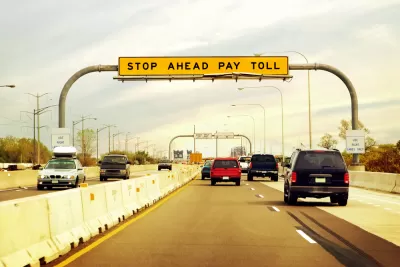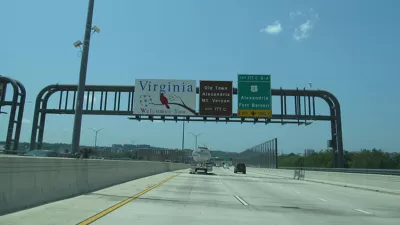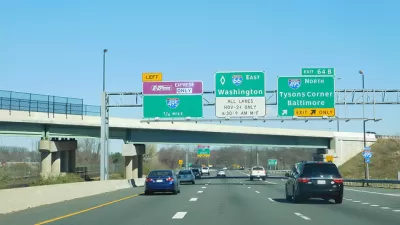Virginia's 66 Express Lanes feature uncapped tolls that change every six minutes with the level of congestion, with most revenue benefiting transit. Carpools travel free, but solo-drivers in electric vehicles pay like others.

The 66 Express Lanes Inside the Beltway between Interstate 495 and Route 29 in Rosslyn, Va. grabbed the nation's attention on day day two of operation, Dec. 5, with its $40 tolls for solo-drivers during the height of the morning rush hour. Carpools of two or more are not charged provided they have an E-ZPass Flex.
The Virginia Department of Transportation (VDOT) allows dynamic tolling to work as intended, unlike other express lanes where tolls may be capped, such as Seattle's I-405 Express Toll Lanes. As a result, Seattle's toll lanes face potential termination for failing to maintain 45 mph, 90 percent of the time.
"The [66 Express Lanes] sticker shock will wear off, and the top price (which changes every six minutes) appears to be stabilizing, but it's far above what was expected," writes Henry Grabar of Slate on Dec. 7.
This reflects a precise objective on the part of the Virginia DOT: keeping traffic moving into the capital. According to VDOT, the average speed on Monday was 57 mph—20 mph faster than this time last year. The tolling mechanism is designed to keep traffic moving at 55 mph—if traffic slows down, tolls go up, and vice versa.
But there's been political backlash due to the high tolls. "Reluctant Republicans had made a deal with Gov. Terry McAuliffe to allow I-66 tolling in exchange for widening the highway," writes Grabar. The "widening compromise," explained in a February 2016 post by James Brasuell, included "an agreement to spend the majority of toll revenue on transit projects in the corridor." Readers should observe the D.C. Metro Orange Line running in the median of the corridor.
Now, [Republicans] say the rates are “unacceptable” and the timing (after the gubernatorial election) suspicious, and they have called on governor-elect Ralph Northam to clean up the mess. But without a paradigm shift in infrastructure spending, a big, thriving city cannot maintain the delicate balance between moving traffic, well-maintained roads, and cheap commuting for solo drivers.
The opposite is occurring in Austin and Dallas, where the Republican governor and lieutenant governor have essentially halted express lane projects by denying the use of state transportation funding due to the unpopularity of toll lanes.
Tolling is partly a response to the failure of gas taxes and user fees to pay the for road infrastructure. "Dynamic tolling—enabled by tech that has abolished tollbooths—ensures roads run smoothly at peak times and nudges people toward carpooling and transit," adds Grabar.
While tolling an entire interstate is prohibited without obtaining a waiver from the Federal Highway Authority, as Indiana is attempting, this could soon change as "Trump's infrastructure white paper called for legalizing the tolling of interstates across the board," observes Grabar.
Barring some new political reality, the rise of tolling is inevitable, and to the extent it can fund or encourage carpooling, transit, and transit-oriented development, that's all the better.

Alabama: Trump Terminates Settlements for Black Communities Harmed By Raw Sewage
Trump deemed the landmark civil rights agreement “illegal DEI and environmental justice policy.”

Planetizen Federal Action Tracker
A weekly monitor of how Trump’s orders and actions are impacting planners and planning in America.

The 120 Year Old Tiny Home Villages That Sheltered San Francisco’s Earthquake Refugees
More than a century ago, San Francisco mobilized to house thousands of residents displaced by the 1906 earthquake. Could their strategy offer a model for the present?

LA’s Tree Emergency Goes Beyond Vandalism
After a vandal destroyed dozens of downtown LA trees, Mayor Karen Bass vowed to replace them. Days later, she slashed the city’s tree budget.

Sacramento Leads Nation With Bus-Mounted Bike Lane Enforcement Cameras
The city is the first to use its bus-mounted traffic enforcement system to cite drivers who park or drive in bike lanes.

Seattle Voters Approve Social Housing Referendum
Voters approved a corporate tax to fund the city’s housing authority despite an opposition campaign funded by Amazon and Microsoft.
Urban Design for Planners 1: Software Tools
This six-course series explores essential urban design concepts using open source software and equips planners with the tools they need to participate fully in the urban design process.
Planning for Universal Design
Learn the tools for implementing Universal Design in planning regulations.
Ada County Highway District
Clanton & Associates, Inc.
Jessamine County Fiscal Court
Institute for Housing and Urban Development Studies (IHS)
City of Grandview
Harvard GSD Executive Education
Toledo-Lucas County Plan Commissions
Salt Lake City
NYU Wagner Graduate School of Public Service




























